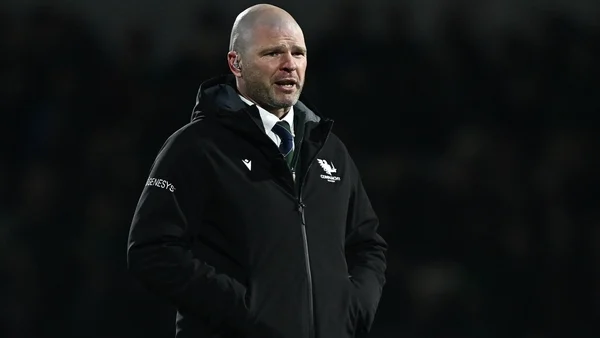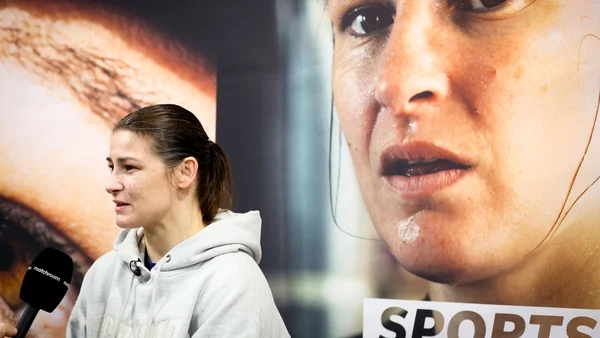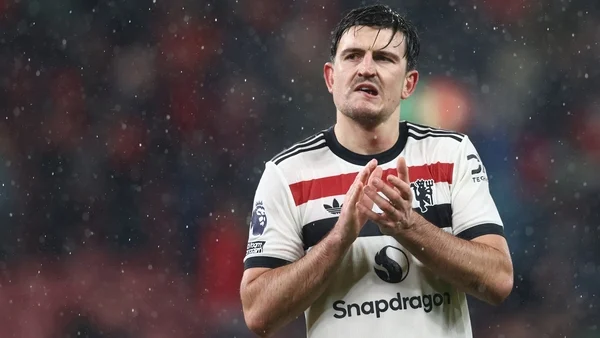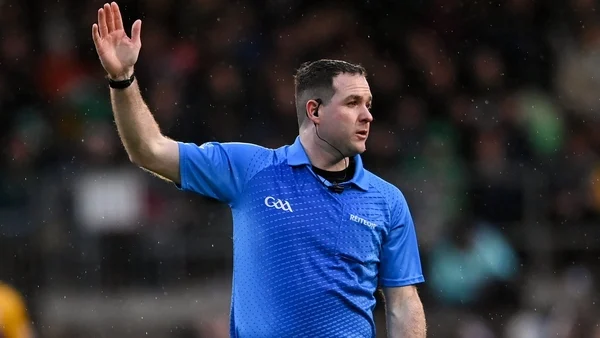The defeat to the All Blacks was one of those head scratching moments where Ireland were out-muscled, tactically second best and didn't have the answer to the New-Zealand shaped problem in front of them.
However, on second viewing, when you watch the game more objectively, there are a lot of answers and controllable moments for Ireland to address.
When you think back on the game, Ireland were ahead, admittedly by a single point, after Damien McKenzie’s penalty came back off the post and Jamison Gibson-Park hacked the ball to safety. Nevertheless, the clock was reaching 60 minutes, a substantial portion of the game had been played and Ireland were a point up.
When you lose a game, you hear the hysteria around how poor Ireland were tactically, they should have adapted their game or they should have kicked to the corners etc. Ireland were winning the game and had taken control in the third quarter. You don’t win matches after 60 minutes, but they certainly weren’t out thought up to that point.
There were frustrations. Some attacking plays resulted in poor handling errors and more to the point, their lineout lost another handful of opportunities.
The game had ebbed and flowed up to that 60-minute mark. Ireland started well. New Zealand probably dominated proceedings for most of the first half, but Ireland’s well-worked setpiece power plays put them in good positions.
One of them led to the Bundee Aki offload to Garry Ringrose which caught Jordie Barrett enough for his tackle to see a yellow card, and Ireland won an important penalty to close the gap to just three points.
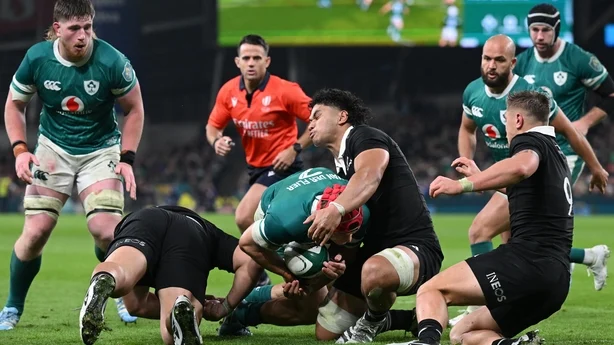
After half-time, Ireland revved things up, after a fortuitous enough penalty from the kick-off. Their attacking strategy led to Josh van der Flier crossing the line, even if the maul failed to set the platform, before a ravaging defensive effort earned them the ball back. In six phases Ireland had crossed for the first try of the game.
At that stage there were no calls for being tactically inept and we were yet to see the selection issues.
Being ahead at 60 minutes and losing by 10 points probably highlights the biggest issue that Ireland had. Despite their penalty concessions being far too high, and their missed tackles being somewhere around the 30 mark, Ireland didn’t have the impact off the bench that we’ve come to expect from a tactically astute Andy Farrell team with strong selections.
Ciaran Frawley had a night that he’d prefer to forget. Unfortunately in sport, you can’t just erase the memory. These nights, and more importantly the reaction to these nights, are what shape your career and make the good days worthwhile. Frawley is very aware of the basic handling errors that he made, before anyone else ever calls them out.
The last time Frawley wore a green jersey, he was seen as a mentality monster. He stroked over two winning drop goals to beat the world champions in their home venue.
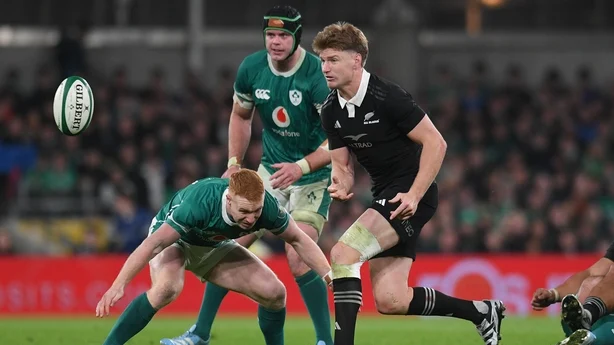
His uncharacteristic dropped balls were so far from what we’ve come to expect from him that they should be easier to shrug off. He wasn’t the only one that made errors. Jack Crowley and Bundee Aki both had knock-ons when Ireland were finding some attacking rhythm.
The point is that errors throughout the game, but particularly in the final quarter, created separation between the two teams.
There was a scrum penalty at 60 minutes that pushed New Zealand into the lead. It seemed like a dubious call, but regardless of that, the fact is that Finlay Bealham had gone off for Tom O’ Toole. Bealham put in a shift, and unfortunately for O’ Toole he had to be removed from the pitch because of a head injury, moments after coming on.
It meant that Bealham had to go nearly the full 80 minutes as a tighthead. Tighthead is the first tactical change in every game. To play the full game is a serious challenge, and that’s what Bealham had to do.
I’m no scrummaging expert, but had Bealham been fresher, he may have done enough to keep Tu’ungafasi from stepping around him in that crucial scrum. The New Zealand loosehead was undoubtedly first to lose a square stature. Bealham, either through weight or fatigue, couldn’t stay square and changed his angle in as well, after the pressure came on.
Normally, the referee is quick to spot a loosehead's hips kicking out, although in this instance it was subtle. However, it’s not unlike what Tyrel Lomax did to Andrew Porter in the World Cup, yet Porter was the one pinged that time.
Regardless, that penalty seemed like a gateway to New Zealand breaking for victory.
Ireland’s bench had penalties, confusion in lineouts, knock-ons and real momentum breaking moments that stopped them from mounting a response.
There were errors during the rest of the game too, and you can’t blame the Irish bench when they weren’t on the pitch. Yet, the error count was disproportionately high by some of the Irish substitutions.
The answer to the poor bench impact isn’t to panic and launch Cian Prendergast, Cormac Izuchukwu or others straight in against a highly dangerous Argentina side. There will likely be a change or two but it will be a loss less reactive than that.
If iaran Frawley can have a bad day at the office, then so could anyone else. The fact that a guy like him, who has put a lot of pressure on to get a start, can have a bad day, then imagine what could happen to a younger and less experienced player.
Imagine what that could do to their confidence and their standing in the public eye. Yes, the reward would mean exponential growth, and for Ireland it could mean more competition around the squad with a bigger playing pool of experienced internationals.
Yet, the risk is stunting a person’s career, and Farrell is responsible for developing a player at a rate that he sees appropriate, no matter how much supporters may want to see it happen.
Ireland’s reaction to last weekend will be much more important than some of the public hysteria.
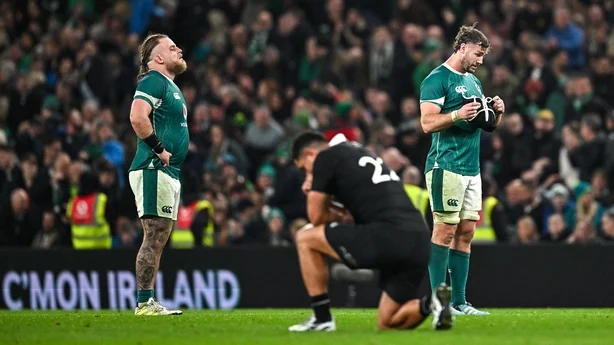
If you cut out a few lineout errors and a number of handling errors, Ireland could have won that game and we’d be singing their praises.
The area that needs some addressing is the fact that Ireland couldn’t keep New Zealand away from their half for long periods of the first half. It felt like the kick strategy was just about getting Ireland out of trouble, before New Zealand launched themselves back in.
I don’t think it was a performance that Ireland or Farrell will accept, but there are tough days in sport too, and sport hinges on a couple of moments that could go either way.
We often see a result hinge on a successful or unsuccessful kick. It completely changes the perception on a one-point win or a two-point loss, despite the performance across 99% of the game being the same.
Ireland didn’t lose because of one moment. However, the objective second view of the game can give more coaching actions and less reason for emotional panic. With a few tweaks to their game next week, Ireland could have a drastically different performance.
Argentina will travel to Dublin in red-hot form. It’s a tough opposition for Farrell’s side to get back to winning ways, but with great pressure comes opportunity to right some wrongs.

